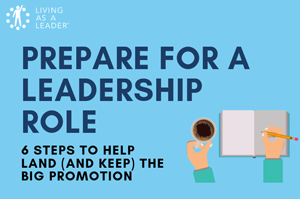
A new leadership position has just been posted, and you want it. You might think you’re a shoo-in because you have the technical expertise and you’re the highest performing individual contributor.
Here’s the catch:
just because you’re good at what you do, it doesn’t necessarily mean that you will be a good leader.
What organizations are looking for when hiring a leader
Many leaders show up every day very well-intended, doing the best they can…yet they often fall short of what organizations need and what employees want. In general, organizations need leaders who can effectively balance the accountability for work being accomplished, with inspiring employees.
As you progress in your professional career and move toward leadership, it is important that you dedicate time toward learning how to be a leader.
Organizations want results. Employees want fulfillment.
Below are six steps to help you as you begin to prepare yourself for leadership success.

Commit to Learning How To Be A Leader. Regardless of the date of your promotion, either in the past or future, I encourage you to consciously commit to the study of leadership: Read books, attend seminars, participate in training, and talk to others who are in leadership.
There needs to be a moment in which you say to yourself, “I am a leader of people. This is a privilege, and I will take it seriously…because the people I will lead deserve it.”
Find A Mentor. Identify a leader whom you admire, a leader you would like to learn from. Ask this person if they would be willing to meet with you every four to six weeks over a cup of coffee.
During this time, plan to lean on this person as a resource to troubleshoot issues you are experiencing. Ask them to help you determine what to do and what to say in a variety of situations.
In addition, ask if they will be willing to share wisdom and insight from their own experiences to help you advance in your professionalism.
Get Comfortable With Uncomfortable Conversations. This is critical. Many leaders, when faced with difficult situations, choose to avoid! They don’t know what to say. They don’t know what to do. So, they do nothing.
If you can learn how to approach people in a way that shows concern and does not suggest blame, you will be ahead of the curve. It will help if people understand your intentions to help everyone be the best they can be.
A test of your effectiveness will be to pay attention to whom you are talking. Do you talk to the person you have an uncomfortable situation with, or do you talk to someone else about them?
Establish Professional Standards. Have you ever talked about someone behind their back? Have you talked poorly about the company you work for? How about profanity? Do you use it? These are all examples of unprofessional behaviors or standards.
As a leader, you need to hold yourself to a higher standard. Now is a great time to begin conducting yourself in such a way.
A professional standard may be stated like this: “I am someone who does not talk about people behind their back.” I encourage you to have five to seven standards you will follow unconditionally.
Prepare for leadership by setting yourself apart from others in terms of how you conduct yourself.
Become Effective At Giving Balanced Feedback. Feedback is the most neglected responsibility of a leader. Our focus on feedback has two parts:
1) Be generous with positive feedback and
2) Be careful about the amount of negative feedback you focus on.
We suggest a ratio of five positive to one negative as you go through your day. As a leader, you need to inspire others by focusing on what they’re doing well. What gets rewarded gets repeated. At the same time, it is important to share suggestions for people to improve.
A focus on feedback shifts the focus away from yourself toward others.
Begin Today. If you aspire toward something bigger than where you are today, begin behaving as if you are already there.
To help you get started, be honest about your existing strengths and weaknesses. I encourage you to ask others to share answers to three questions:
- What do I currently do day in and day out that will help me be an effective leader of people?
- What could I do differently to better position myself to become a leader of people?
- What else will be helpful for me to know about myself from your perspective?
As you begin to move forward on the steps shared above, keep this thought in mind:
Leadership is a privilege and a responsibility. It is not a promotion, a title and a pay raise.
I wish you well in your journey toward leadership!